Conditioning
Five reasons why saving on washing water is important
Agriculture and water are inextricably linked. In April, however, the dry season started once again. As the demand for water increases, so does the risk of water shortages. Some years ago, this problem mainly occurred in Africa and Asia, but recently the phenomenon has been spreading to the Western world. In the summer of 2018, several countries had to contend with a shortage of water. This resulted in smaller harvests and higher produce prices. Sufficient water is essential ? and that also applies to the fruit and vegetable sector. Yet we can no longer take an ample supply of fresh water for granted, making reduced water usage become vital. VAM WaterTech products deliver savings on washing water of up to 95%. In this article, we explain just why saving on washing water is so important.
06 June, 2019
Agriculture and water are inextricably linked. In April, however, the dry season started once again. As the demand for water increases, so does the risk of water shortages. Some years ago, this problem mainly occurred in Africa and Asia, but recently the phenomenon has been spreading to the Western world. In the summer of 2018, several countries had to contend with a shortage of water. This resulted in smaller harvests and higher produce prices. Sufficient water is essential and that also applies to the fruit and vegetable sector. Yet we can no longer take an ample supply of fresh water for granted, making reduced water usage become vital. VAM WATERTECH products deliver savings on washing water of up to 95%. In this article, we explain just why saving on washing water is so important. 1) Reduced use of clean water: using up to 95% less washing water also means huge savings on clean water. Whats more, this also brings a 95% reduction of water usage costs. 2) Saving on environmental costs: thanks to the complete closure of the water cycle, no water discharge is required. As a result, environmental costs are reduced, and less polluted water is pumped back into the environment. 3) Savings on machine maintenance and downtime: washing with clean water leads to greater production certainty and reduces wear on process machines. As a result, production is less frequently disrupted and less production line maintenance is needed. 4) Reduced or no intake of (spring) water: more sources are drying up. Many parties in the fruit and vegetable sector are using spring water, causing more sources to run dry. When washing water is recirculated, less intake of (spring) water is needed, or none at all. 5) Reduced strain on connected systems, such as biological treatment of process water: without additional systems there is no influx of inorganic material and reduced hydraulic load.











